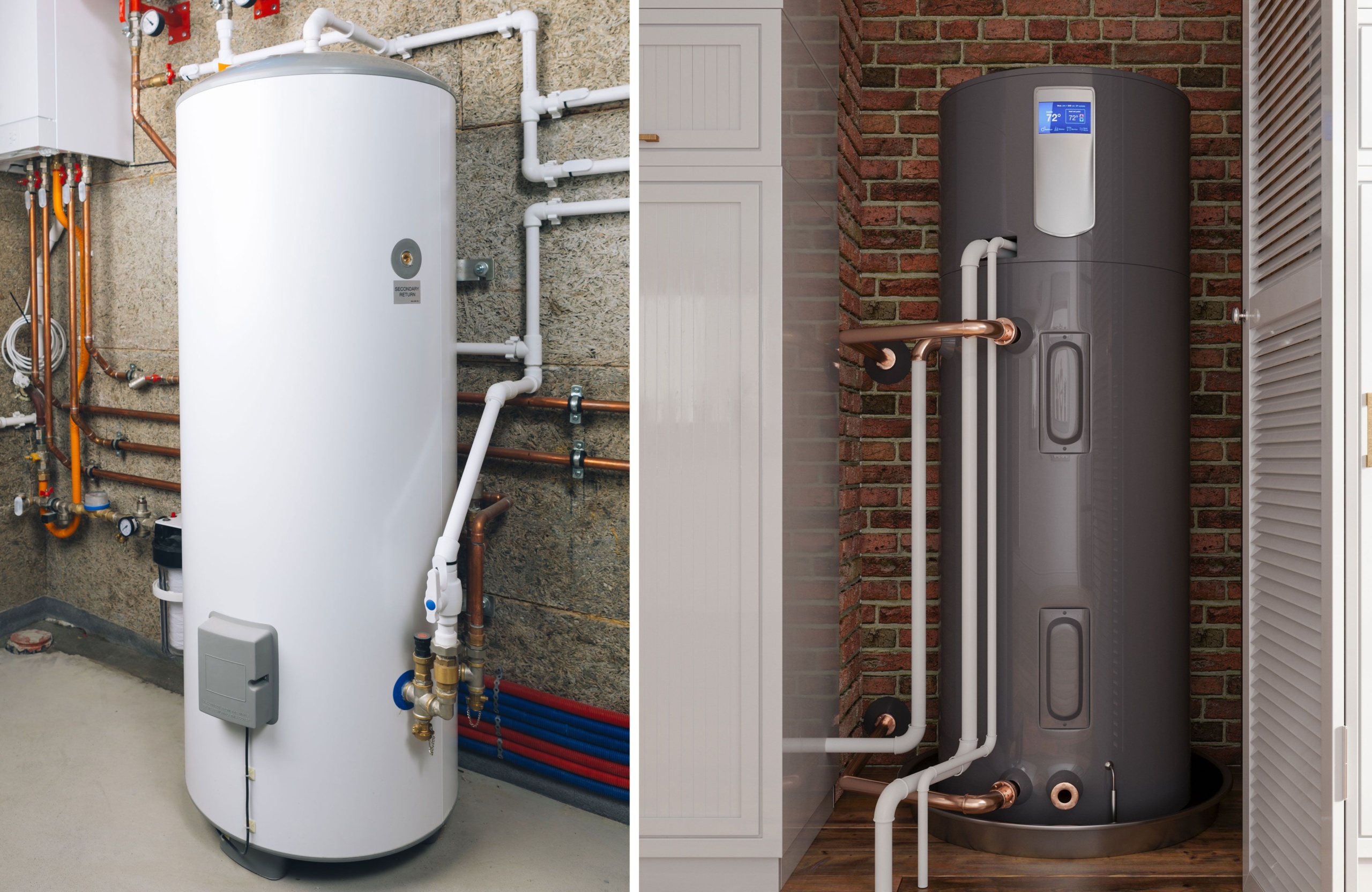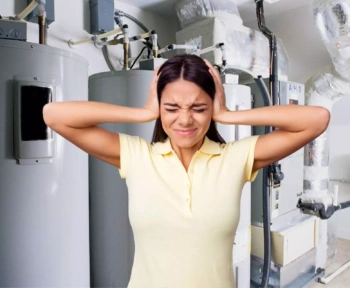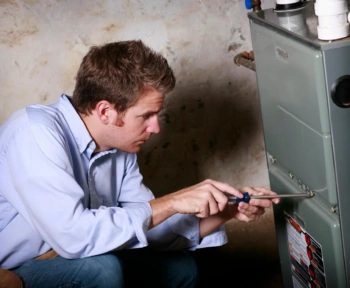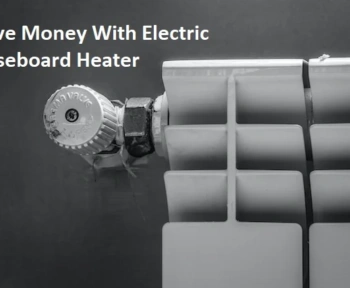In the quest to find the most efficient and cost-effective solution for heating water in our homes, two contenders stand out: Heat Pump Water Heaters (HPWHs) and Gas Water Heaters. Each system offers distinct advantages and poses unique considerations, making the choice between them pivotal for homeowners. This comprehensive guide delves into heat pump water heater vs gas and its work, benefits, and drawbacks of both HPWHs and Gas Water Heaters, examining factors such as climate adaptability, cost-effectiveness, environmental impact, and installation requirements to help you make an informed decision that best suits your home’s needs and values.
Heat Pump Water Heaters: Efficiency and Eco-Friendliness
1. How They Work:
Heat pump water heaters (HPWHs) are a cutting-edge technology that transfers heat from the surrounding air to the water in the tank, rather than generating heat directly. This process is similar to how a refrigerator works, but in reverse. The heat pump extracts heat from the air, intensifies it with a compressor, and then transfers it to the water.
2. Energy Efficiency:
HPWHs stand out in terms of energy efficiency. They are generally two to three times more energy-efficient than traditional gas or electric water heaters. This is due to their heat transfer method, which requires significantly less electrical energy to heat water than conventional methods. Over time, this high efficiency can lead to substantial savings on electricity bills, often making up for the higher initial purchase price. In addition, some models come with programmable timers that help optimize energy usage during off-peak hours, further increasing their efficiency.
3. Environmental Impact:
From an environmental standpoint, HPWHs are a greener option. They reduce the reliance on fossil fuels and have a lower carbon footprint, particularly when the electricity used is sourced from renewable energy. Additionally, they contribute less to air pollution and greenhouse gas emissions compared to gas water heaters.
4. Cost Considerations:
The initial purchase price of HPWHs is typically higher than that of traditional gas water heaters. However, the long-term savings in energy bills can be significant. For instance, according to the U.S. Department of Energy, homeowners can expect to save several hundred dollars annually on their electric bills. Over the lifespan of the heater, these savings can compensate for the higher upfront cost.
5. Installation and Maintenance:
The installation of a HPWH can be more complex and costly than a traditional water heater. It typically requires a larger upfront investment, which may include modifying existing ductwork or ensuring adequate space for the unit to operate efficiently. The average installation cost can range from $1,200 to $3,500, varying based on location, existing infrastructure, and unit capacity.
HPWHs are generally larger than traditional water heaters and need to be installed in locations that stay between 40°F and 90°F year-round and provide at least 1,000 cubic feet of air space around the water heater. This makes them ideal for installation in spaces like basements or garages where excess heat is often available. Additionally, they may require a condensate drain, which can add to the installation complexity.
In terms of maintenance, HPWHs require regular cleaning of air filters and may need more frequent servicing than traditional models. However, they are generally designed for durability and long-term performance.
6. Space Requirements:
HPWHs typically require more physical space than conventional heaters. This is because they need sufficient air volume from which to draw heat. Homeowners should ensure they have enough space for installation, keeping in mind that cramped spaces can hinder the efficiency of the heat pump.
7. Climate Considerations:
The efficiency of HPWHs can be influenced by the climate. They are most effective in warm or mild climates where the ambient air temperature is within the optimal range for heat extraction. In colder climates, their efficiency can decrease, which might require a supplementary heating source during the coldest months.
Gas Water Heaters: Quick Heating and Lower Initial Cost
1. How They Work:
Gas water heaters utilize natural gas or propane as fuel to directly heat the water. These heaters have a burner at the base of the tank, with the heat rising to heat the water in the tank above. They are often the preferred choice in regions where natural gas is abundantly available and more cost-effective compared to electricity.
2. Quick Heating:
One of the most significant advantages of gas water heaters is their rapid heating capability. They can heat water faster than electric heaters, including heat pump water heaters (HPWHs). This attribute makes them especially suitable for large households or situations where the demand for hot water is high. The recovery rate (how quickly after use the hot water supply is replenished) of gas water heaters is generally higher than that of electric models, ensuring a more consistent supply of hot water.
3. Lower Initial Cost:
When considering upfront costs, gas water heaters typically have a price advantage over HPWHs. This lower initial investment can be a crucial deciding factor for many homeowners, especially those with budget constraints. The cost for a standard gas water heater might range from $300 to $600, not including installation.
4. Energy Efficiency:
Modern gas water heaters have made significant strides in terms of energy efficiency. While they may not be as efficient as HPWHs, choosing an Energy Star-certified gas water heater can ensure you are getting a model that uses fuel efficiently, ultimately saving on gas bills. These newer models often include features like improved insulation, more efficient burners, and advanced heat exchangers to enhance efficiency.
5. Installation and Fuel Availability:
The installation of gas water heaters is more complex than electric models, mainly due to the need for venting exhaust gases. The cost of installation can vary widely, depending on whether existing gas lines and vents can be used or if new ones need to be installed. On average, installation costs can range from $700 to $2,000. It’s important to consider that improper installation can lead to inefficiencies and even safety hazards, so professional installation is recommended.
In addition to the venting, the availability and cost of natural gas or propane in your area are crucial factors. In regions where gas is less expensive than electricity, gas water heaters can be more cost-effective in the long run despite being less energy-efficient than HPWHs.
6. Space and Venting Requirements:
Gas water heaters require adequate space for safe operation, primarily due to the need for proper venting to expel combustion gases. This often means they cannot be installed in tight, enclosed spaces without adequate ventilation. The type of venting required (direct vent, power vent, etc.) can also influence the installation location and cost.
7. Maintenance and Longevity:
Regular maintenance is important for gas water heaters to ensure they operate safely and efficiently. This includes periodic checks of the burner, venting, and ensuring the tank is free of sediment build-up. While their lifespan is comparable to electric heaters, proper maintenance is crucial for maximizing their service life.
Making the Right Choice Between Heat Pump Water Heater vs Gas
When deciding between a heat pump water heater and a gas water heater, several key factors must be considered to ensure that you choose the most suitable option for your home.
1. Climate Considerations:
– Colder Climates: In colder regions, gas water heaters often have the edge in efficiency and performance. They can operate effectively regardless of the outside temperature, providing consistent hot water even during cold spells. Additionally, HPWHs can lose efficiency in colder climates since they rely on ambient air temperature to heat water.
– Milder Climates: HPWHs are particularly well-suited to milder climates. They operate most efficiently in environments where the ambient air temperature is within their optimal operating range (typically between 40°F and 90°F). In these conditions, HPWHs can maximize energy efficiency and cost-effectiveness.
2. Long-Term Savings vs. Upfront Costs:
– Upfront Costs: Gas water heaters generally have a lower initial purchase and installation cost compared to HPWHs. This can be an attractive option for those with limited upfront budget flexibility.
– Long-Term Savings: Despite the higher initial cost, HPWHs can offer substantial long-term savings on energy bills. They are more energy-efficient and can lead to lower operating costs over time. It’s important to weigh the immediate financial impact against potential savings in the long run.
3. Environmental Concerns:
– Carbon Footprint: For homeowners concerned about their environmental impact, HPWHs are the greener choice. They have a lower carbon footprint, especially when powered by renewable energy sources like solar or wind power.
– Eco-Friendly Operation: While gas heaters rely on fossil fuels (natural gas or propane), HPWHs use electricity, which can be sourced from renewable energy, making them a more sustainable option over the long term.
4. Space and Installation Requirements:
– Gas Water Heaters: These heaters require proper venting for exhaust gases and are often easier to install in homes already equipped with gas lines. However, in homes without existing gas infrastructure, the installation can be more complex and expensive.
– HPWHs: These require a larger space for optimal operation, as they need air flow around the unit. Installation may also involve additional costs if modifications to the existing electrical system are needed.
5. Additional Considerations:
– Hot Water Demand: If your household has a high demand for hot water, a gas water heater’s faster recovery rate might be more suitable.
– Resale Value and Preferences: In some markets, the type of water heater can impact the resale value of your home. Additionally, personal preferences regarding environmental impact, energy sources, and maintenance should be considered.
Conclusion:
Choosing the right water heater for your home is a decision that balances several factors, including energy efficiency, initial costs, environmental impact, and installation logistics. Heat Pump Water Heaters shine in energy efficiency and eco-friendliness, especially in milder climates, but come with higher upfront costs. Gas Water Heaters, on the other hand, offer rapid heating and are cost-effective in terms of initial investment, making them suitable for colder climates and households with high hot water demand. Ultimately, your choice should align with your specific household needs, environmental priorities, and budget constraints. Regardless of the option you choose, ensuring it fits your home’s infrastructure and climate can lead to substantial long-term benefits, both financially and environmentally.




